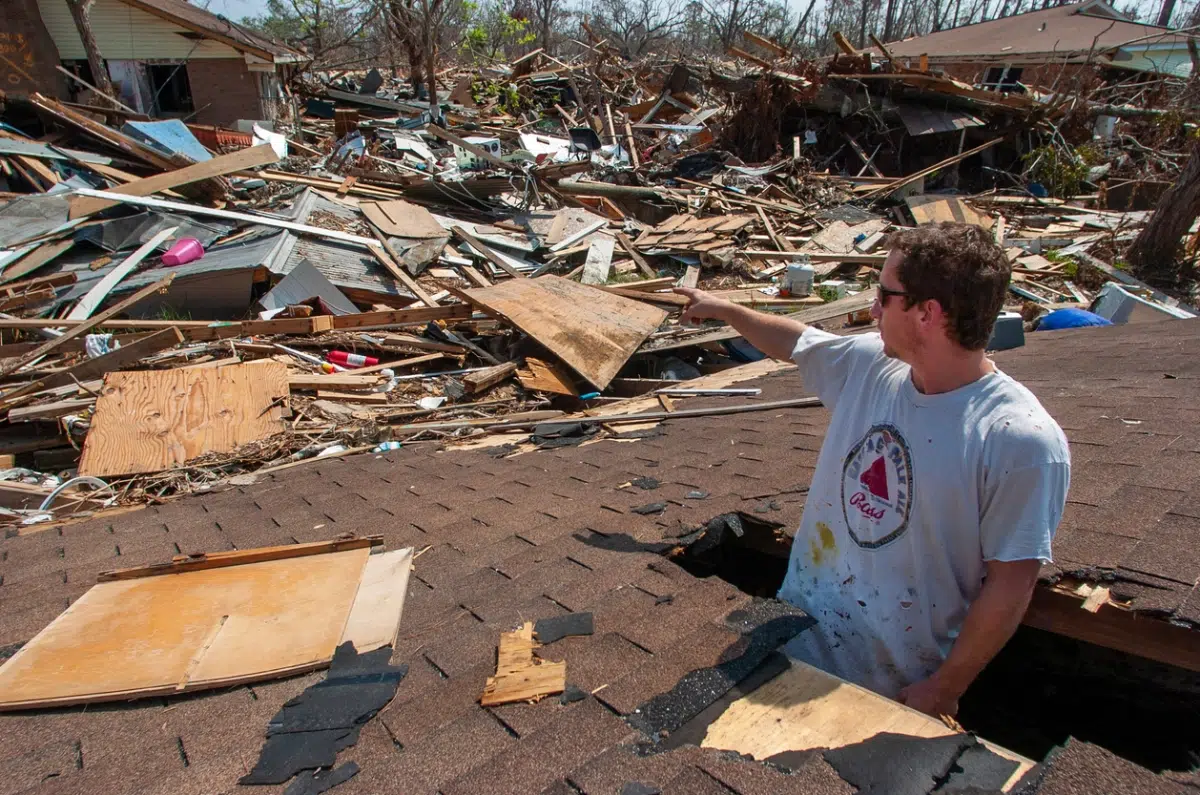
When Milton and Helene struck in 2024, thousands of Florida homeowners scrambled to file claims, with many unsure how much time they actually have. Unfortunately, though, insurance companies often treat delays as an excuse to stall, deny valid hurricane damage, or lowball your settlement.
With an insurance attorney, you don’t have to handle that frustration alone. A hurricane attorney can review your policy, press your insurer at the negotiating table, and help you move your claim forward.
In this guide, we’ll answer the question, “How long after a hurricane can I make a claim in Florida?’’ and explain why acting quickly matters and what steps you can take to protect your property.
Why Timing Matters in Hurricane Insurance Claims
Knowing the time limit to file hurricane insurance claims matters, as it can determine whether you receive the compensation you deserve.
First, immediate documentation of damage provides the strongest evidence for your claim. Fresh damage is easier to attribute directly to the hurricane rather than to pre-existing conditions or subsequent events. Insurance adjusters can more accurately assess the full extent of hurricane-related damage when they inspect it shortly after the event.
Second, delayed hurricane insurance claims can often lead to further property deterioration. Water intrusion from roof damage, for example, can quickly escalate into serious structural issues, mold growth, and electrical hazards if you don’t address it promptly.
Also note that many policies require property owners to take reasonable steps to prevent further damage after a storm, which can become increasingly difficult the longer you wait to file.
Third, insurance companies deal with huge claim volumes after major hurricanes. By filing early within the time frame for hurricane insurance claims, you place your case higher in the queue, helping you get a faster resolution and payment when you need it most.
For instance, during the busy aftermath of hurricanes Milton and Helene, many Florida residents who filed promptly received faster claim processing.
Finally, and perhaps most critically, Florida law has strict deadlines for hurricane insurance claims. Missing this hurricane insurance claim filing time can result in complete claim denial, regardless of how legitimate your damages may be.
How Long After a Hurricane Can I Make a Claim in Florida?
Under Florida Statute 627.70132, you have one year from the date to submit a new or reopened property insurance claim. If you need to add a supplemental claim for the same hurricane, covering losses your insurer already addressed, you get up to 18 months from the date of loss.
With that update to the hurricane claim filing deadline, Florida cuts your filing window from the previous three-year period. With less time to act, you’ll want to start the claims process as soon as possible after a storm hits.
Understanding “Date of Loss”
If you’re asking, “How soon should I file a hurricane damage claim?” you can start by pinpointing your date of loss. Your date of loss is the day the storm made landfall or the windstorm caused damage that your policy covers.
For example, if Hurricane Milton made landfall on October 10, 2024, and you’re asking, “How late can you file a hurricane claim?” your initial deadline to submit that claim is October 10, 2025. Any additional claims for that same event, like a supplemental request, must go in by April 10, 2026.
Special Exceptions
A few situations can pause your deadlines. If you deploy to a combat zone or support post and can’t file on time, your clock stops until you return. For all other Florida homeowners, the one-year and 18-month limits remain in force.
Your policy may also set its own notice rules. It can’t cut short the state’s window, but it may ask you to report damage sooner. Check those notice requirements so you don’t miss a key deadline.
The question of “How long after a hurricane can I make a claim?” has a simple answer: as soon as humanly possible.
While Florida law provides specific deadlines, waiting until those deadlines approach can put your insurance claim at a significant disadvantage. Insurance providers handle claims in the order received, and evidence of hurricane damage can become more difficult to establish as time passes.
How to Document and Report Damage Promptly
By documenting damage right away and notifying your insurer promptly, you steer clear of missed deadlines, and you won’t have to ask, “What happens if I miss the hurricane claim deadline?” Quick action keeps your claim moving forward. Below are some important steps you can take:
Immediate Documentation Steps
Once the storm clears and you can return safely, start gathering evidence right away, as solid documentation can make it harder for insurers to downplay your losses. To help substantiate your claim, take the following steps:
- Capture clear photographs and videos of every damaged area, both inside and out
- List every damaged item, detailing its value and the acquisition date
- Save receipts for temporary housing or emergency repairs if your home is made uninhabitable
- Save weather maps, news clips, or official bulletins that indicate the storm’s path
Finally, notify your insurer according to your policy notice requirements.
Reporting Process
As promptly as possible, contact your insurer via phone, online portal, or mobile app and inform them you’re making a claim report. You may even send a follow-up written notice with your policy number, contact details, date of loss, and a brief description of the damage.
Lastly, if you don’t have your whole policy in hand, request a copy so that you understand exactly what coverage and notice provisions are applicable to your case.
Professional Risk Assessments
When you suspect major structural damage, consider bringing in outside experts to back up your claim. A licensed contractor can inspect your home and provide repair estimates that reflect real costs and are often overlooked by insurers.
A public adjuster, working solely for you, can thoroughly examine every area of your home to find flood damage that the company’s adjuster might miss. And if your foundation or framing shows signs of serious wear, an engineering report can deliver hard evidence of the risk and the expense you’ll face.
Remember that your claim window opens the moment the hurricane makes landfall, not when you first spot damage, and that’s why you need a thorough inspection right away to uncover any hidden harm before time runs out.
Understanding the Role of Delays and Denials
Once you file an insurance claim after a hurricane disaster strikes, Florida law gives insurers clear deadlines. Knowing those dates can help you spot any delays or missed steps and push your insurer to stay on track.
Timeline for Insurer Response After Filing a Claim
According to Florida Statutes §627.7142, your insurer has seven days from receipt of your notice of loss to send you an acknowledgement, unless they cite a valid exception.
Within 14 days thereafter, they have the option to either accept or deny your filed claim. After submitting a completed proof-of-loss form, you can expect an answer (either covered in full, part-covered, or rejected) in 30 days.
Your insurance provider has 90 days from the date you file a claim to make any payment or denial.
Common Causes of Delays and Denials on Hurricane Claims
When you submit a hurricane claim, insurers often look for reasons to slow things down or push back. Missing pages in your proof-of-loss form, like date oversights, item descriptions, or repair estimates, can stall your claim right out of the gate.
Also, adjusters may pin damage on wear and tear before the storm rather than your covered loss, shrinking your payout or denying coverage outright. Your insurance policy may also include exclusions or caps you didn’t spot, maybe on roofs, landscaping, or temporary repairs, leaving gaps in protection.
After a major hurricane, companies often juggle an avalanche of claims and stretch out inspections or payments. And in rare cases, they may flag suspected misstatements or suspect fraud, even when you file a claim with accurate figures.
By gathering complete documentation, noting dates and details, and sticking to your policy’s notice rules, you can avoid these setbacks and keep your claim moving.
Legal Remedies for Improper Delays in the Claims Process
If you suspect your insurer is dragging its feet or unfairly denying your claim, you have several paths at your disposal. For instance, you can consider filing a complaint with the Florida Department of Financial Services. You can also ask for state-facilitated mediation to settle the dispute without having to go to court.
Bringing a lawyer on board gives you targeted advice on challenging the insurer’s tactics and keeps the insurance process moving. And if negotiation falls short, you can file a lawsuit, as Florida law generally gives you five years from the date of the breach to take action.
Remember that your insurer must handle your claim in good faith. If you think they’re stalling without a valid reason or reject a legitimate property damage claim, you may have grounds to pursue bad-faith damages in addition to your policy benefits.
Why a Separate Flood Insurance Policy Matters
Your standard homeowners insurance policy typically excludes flood damage, leaving you unprotected when water from heavy rains, hurricanes, or coastal storm surges invades your home or business.
In Florida, a state prone to flooding as a natural disaster, that gap can force you to pay out of pocket for costly repairs and replacements, which your homeowners insurance coverage typically doesn’t include.
The National Flood Insurance Program (NFIP) steps in to fill this void. Administered by the Federal Emergency Management Agency (FEMA), the NFIP offers a separate flood insurance policy designed specifically to cover flood-related losses.
By pairing your homeowners insurance with a flood insurance policy, you ensure flood coverage, manageable monthly premiums, and a coordinated response when floodwaters strike.
What to Do if You’re Unsure About the Deadline
If you’re unsure how much time you have left to file a claim, taking proactive steps now can help you meet critical insurance policy cutoffs and protect your right to recovery. For instance, reviewing your specific policy carefully can be an important first step. Your policy may set its own notice deadlines that run shorter than state law allows.
Review the “Duties After Loss” (or similarly titled) section to see exactly what notifications your policy requires and when. If you don’t have a copy handy, call your insurance agent or insurer right away and ask for one so you know your obligations.
If damage only becomes apparent well after the hurricane, record the exact date and how you first noticed it. That log likely won’t push back your official filing deadline, but it can give you concrete proof if the insurer questions your timing.
Also, when the filing deadline nears, and you’re still figuring out whether the damage might lead to a higher deductible, submit a protective claim. That notice locks in your right to file a claim on time while you gather more evidence. In it, simply state that you’re assessing potential hurricane damage and will send a full update once you’ve documented the losses.
Don’t Wait — Protect Your Rights Today
When it comes to hurricane insurance claims, time is not on your side. The current one-year deadline for initial claims in Florida leaves little room for delay, especially considering the complexity of documenting and substantiating extensive hurricane, flood, or wind damage.
At Kennon Law, our insurance attorneys can help review your insurance policy and inspect your losses. We’ll contact your insurer to learn why your claim stalled or why they offered less than you needed.
And you don’t have to absorb legal fees up front because we’ll provide a free review of your situation and claim details. Schedule your free consultation today and take the next step to protect your property and receive fair compensation.


